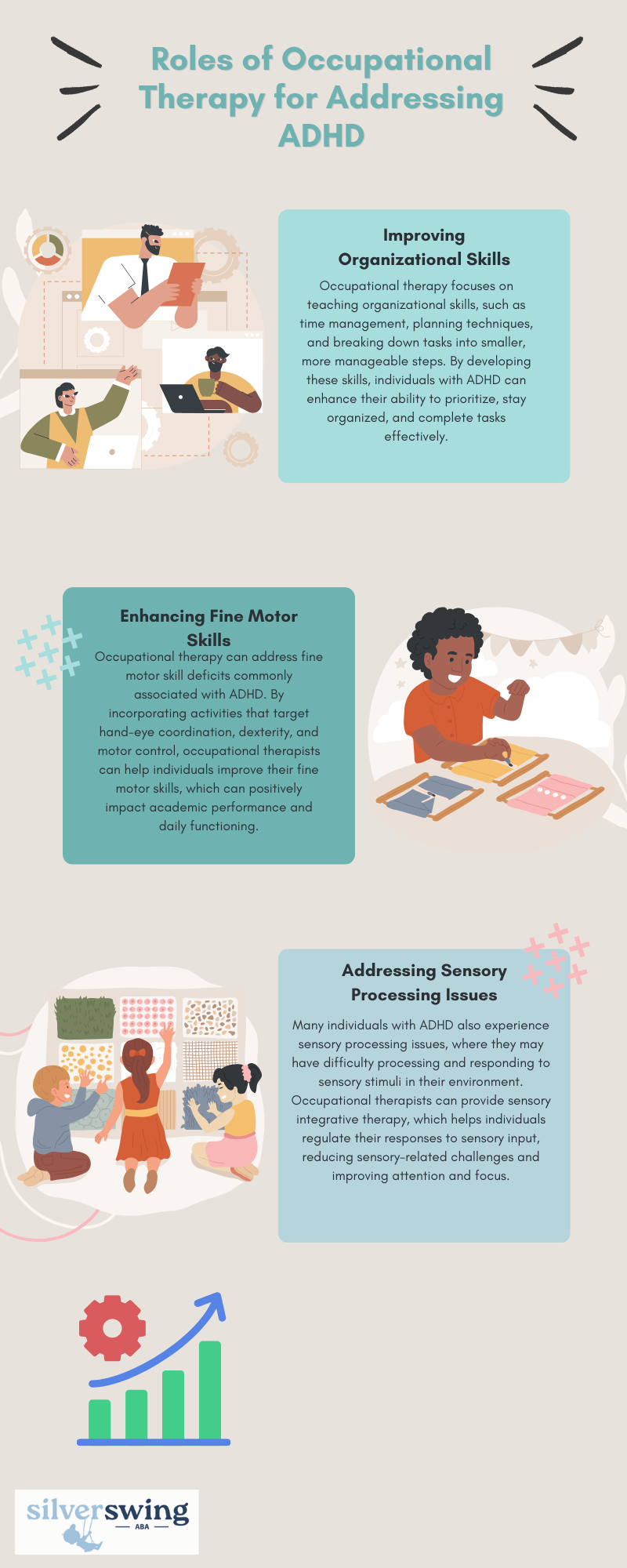ADHD is characterized by persistent patterns of inattention, hyperactivity, and impulsivity that can significantly impact an individual’s daily life. These symptoms may vary in severity and can affect academic performance, social interactions, and overall quality of life.
As far as dealing with ADHD goes, there are a handful of interventions that have been proven effective. One of them is occupational therapy. Let’s find out how effective it actually is.

Benefits of Occupational Therapy for ADHD
Occupational therapy plays a valuable role in supporting individuals with ADHD by addressing specific challenges associated with the condition. Through targeted interventions, occupational therapy can help various aspects of an individual’s life.
These are as follows:
Improved Organizational Skills
One of the key benefits of occupational therapy for individuals with ADHD is the improvement of organizational skills. Occupational therapists work closely with patients to develop strategies for managing time, planning techniques, and breaking down tasks into smaller, more manageable steps.
By teaching effective organizational techniques, such as creating visual cues, organizing materials, and maintaining clutter-free workspaces, occupational therapy helps individuals with ADHD navigate daily activities with greater ease.
A 2020 study demonstrated the positive impact of occupational therapy on routines and time management. The study showed that occupational therapy interventions targeting these areas resulted in lower stress levels and fewer ADHD symptoms for women with ADHD. This highlights the effectiveness of occupational therapy in supporting individuals in developing and implementing effective organizational strategies.
Enhanced Fine Motor Skills
Occupational therapy also plays a significant role in enhancing fine motor skills in individuals with ADHD. Fine motor skills refer to the coordination and control of small muscles, particularly those in the hands and fingers. Difficulties with fine motor skills can impact various tasks, including writing, typing, and manipulating objects.
Occupational therapists employ specific techniques and activities to help individuals with ADHD improve their fine motor skills. These may include exercises to strengthen hand muscles, activities that enhance hand-eye coordination, and tasks that promote dexterity and precision.
By targeting these skills, occupational therapy can contribute to improved handwriting, increased proficiency in daily activities, and enhanced overall motor function.
Sensory Processing Issues
Sensory processing issues may coexist with ADHD, affecting an individual’s ability to process and respond to sensory information from their environment. Occupational therapy provides valuable support in addressing these sensory processing issues.
Through sensory integrative therapy, occupational therapists work to reorganize the sensory system, helping individuals with ADHD better process sights, sounds, smells, and other sensory stimuli. By incorporating sensory-based activities and exercises, occupational therapy aims to reduce sensory sensitivities, improve self-regulation, and enhance overall attention and focus.
While research on the effectiveness of sensory processing disorder treatment is ongoing, there is evidence to suggest that occupational therapy interventions can lead to improvements in impulsivity and hyperactivity associated with ADHD.
Role of Occupational Therapy
Occupational therapy can be a beneficial intervention for individuals with ADHD, providing strategies and techniques to help manage their symptoms and improve their functional abilities.
Here are some ways in which occupational therapy can play a role:

Occupational therapy takes a holistic approach, considering the physical, social, educational, and organizational deficits associated with ADHD. Individualized treatment plans are developed and tailored to the specific needs, skills, and activities of each individual. By targeting these areas, occupational therapy aims to lessen the impact of ADHD on daily life and improve overall functioning.

Occupational Therapy Studies and Findings
To explore the effectiveness of occupational therapy in addressing ADHD symptoms, it’s important to learn various studies that were conducted. These studies provide valuable insights into the benefits of occupational therapy interventions for individuals with ADHD.
Here are some notable findings:
Time Management Improvement
In a small-scale study conducted in 2018, 38 children between the ages of 9 and 15 were randomly assigned to either work with an occupational therapist for 12 weeks or be part of a control group. The results showed that the children who received occupational therapy demonstrated a significant improvement in their ability to manage their time effectively and their general awareness of time.
This finding suggests that occupational therapy interventions can be instrumental in helping individuals with ADHD develop better time management skills.
Stress Reduction and Task Performance
Another study conducted in 2020 focused on 23 female participants with ADHD. The participants were divided into two groups: a 7-week occupational therapy intervention group and a control group. The results of the study indicated that the participants in the occupational therapy group experienced reduced stress levels and ADHD symptoms.
Additionally, they demonstrated enhanced task performance and satisfaction compared to the control group. These findings suggest that occupational therapy interventions can have a positive impact on stress reduction and task performance in individuals with ADHD.

Building Executive Function Skills
Research has consistently shown that occupational therapy is effective in improving executive function skills in individuals with ADHD.
Executive functions refer to a set of cognitive processes involved in planning, organizing, and completing tasks. A systematic review analyzed several studies and concluded that occupational therapy interventions can effectively enhance executive function skills in individuals with ADHD.
By addressing specific challenges related to executive functions, occupational therapy helps individuals develop strategies to improve their organization, time management, and problem-solving abilities.
The findings from these studies support the use of occupational therapy as a valuable intervention for individuals with ADHD. Occupational therapy interventions can help individuals improve their time management skills, reduce stress, enhance task performance, and develop executive function abilities.
These positive outcomes highlight the potential of occupational therapy in providing comprehensive support for individuals with ADHD.
Sources:
https://www.occupationaltherapy.com.au/how-can-occupational-therapy-help-kids-with-adhd
https://www.medicalnewstoday.com/articles/occupational-therapy-for-adhd
https://www.healthline.com/health/adhd/can-occupational-therapy-help-people-who-have-adhd
https://www.webmd.com/add-adhd/childhood-adhd/occupational-therapy-for-children-with-adhd




